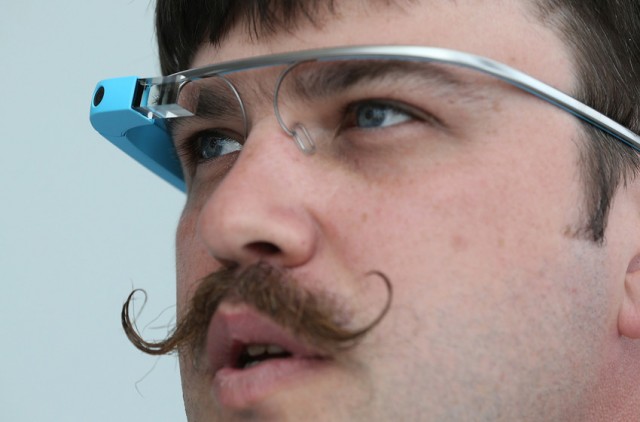Here is the NameTag demo:
Tussy says users will have control over what information can be accessed:
"I want to stress that only already public information is shown, and we will let people control their profiles and opt out if they want," he said in an email. "This is for people that want to be recognized and want to meet others in this way. It's not for people who wish to remain anonymous... Unless, you have been deemed by the courts to not have that right, i.e., sex offenders."
Google, which has dealt with Glass privacy and security concerns since its launch, does not approve of facial recognition apps for the device; a line in its developer policies for Glass specifically says, "Don't use the camera or microphone to cross-reference and immediately present personal information identifying anyone other than the user, including use cases such as facial recognition and voice print."
But as VentureBeat reported, "technically savvy Glass owners can easily jailbreak their smart glasses and install any apps they want. … Google itself has released instructions on exactly how to accomplish that."
And the floodgates appear to be open already. Later this month, according to Forbes, 24-year-old Stephen Balaban of San Francisco's Lambda Labs plans to release another unauthorized app for Glass at the Chaos Communications Congress hacker conference in Hamburg.
Balaban's FaceRec app will allow you to collect and catalog images of faces seen through the Glass lens, along with other recognizable objects such as computer screens and license plates. It will then let you integrate that data with location coordinates, so you'll have a record of who or what you saw, and when and where you saw them.
At the moment, Forbes says, "Lambda’s software doesn’t capture images fast enough to identify faces in real time, and doesn’t have a database of faces and personal details to draw from – users have to identify photographed faces manually or write their own script to take the data from Facebook, which violates its terms of service." But eventually, as Balaban told Forbes:
“Facial recognition is only going to get better, and soon you’ll be able to not only look at someone you’ve met once, but people you’ve never met before, and immediately see what you have in common,” says Balaban. “You’ll be able to go to a conference and see all the engineers with Android experience or walk around at a networking event and see all the potential investors.”
Balaban admits that there may be serious privacy implications, but he thinks it's a worthwhile tradeoff.
“Some of the applications definitely outweigh the privacy issues,” he says. “This technology is very useful, whether you have Alzheimer’s and you’re forgetting your loved ones’ names, or if you’re blind and use it to recognize people at all. It’s kind of a big deal.”
Here is the Lambda Labs demo:
Balaban has also developed a Glass-like, Android-based device that he calls the Lambda Hat. Described as a cap with a camera, it has a much longer battery life than Glass. On Monday, Lambda will start accepting pre-orders for the hat.
The government is recognizing the expansion in facial recognition technologies and the need to establish policies concerning products and usage. To that end, the National Telecommunications and Information Administration will meet in February 2014 with groups and companies to draft privacy guidelines for a rapidly growing industry. Facial recognition technology is already used by law enforcement, and for commercial uses. As U.S. News & World Report notes:
Facebook uses facial recognition software in its photo database, as does Google for its Picasa photo design website. Consumer products using biometrics are expected to become more popular in 2014. Fingerprint scanning technology will likely become mainstream in 2014 because of consumer demand for the biometric password feature used on Apple's iPhone 5S.
Retailers also want the chance to develop facial recognition technology, says Mallory Duncan, general counsel for the National Retail Federation, one of the trade groups participating in the NTIA meetings. Facial detection tools could tailor an advertisement on a digital billboard to a customer, depending whether the consumer facing a kiosk is a man or woman, and depending on age range, but this is still largely an exhibit used at trade shows and none of NRF member companies have plans to use that technology, Duncan explains. Facial recognition software because is more specific and advanced than facial detection, and could be developed for security uses including store surveillance cameras to track shoplifters with an arrest record.
